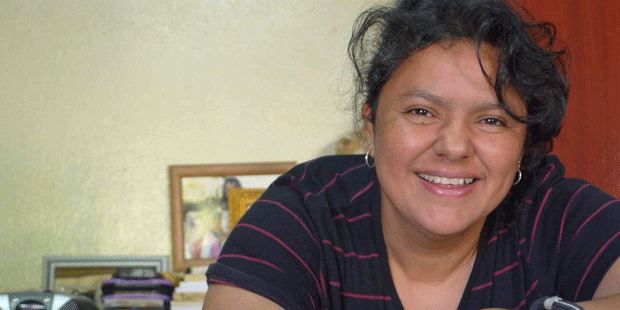Environmental activism in Latin America very frequently pits indigenous local leaders against rapacious companies backed by foreign money and the full military weight of the state. As IB’s Brian Hagenbuch writes here, the separate murders of two recent winners of the prestigious Goldman Prize over the past year, in Mexico and Honduras, threw a spotlight on a much larger pattern of violence and intimidation that claimed dozens of lives in the region.
Mark Baumer’s final blog post on January 21, 2017 was morbidly prophetic. A writer and activist, Baumer was walking barefoot across America to raise money and awareness for climate change and other environmental causes. In the post, the 33-year-old Brown University graduate, who had already completed an 81-day trek across the country in 2010, described a phone conservation he had had the previous day with his father about “trying to find hope in a system where the only safety net will be wealth.”
On inauguration day, Baumer had donned his reflective vest, a backpack with his spartan belongings, and walked from Defuniak Springs to Mossy Head, Florida. The following morning, in what had become his signature blogging style — a fractured mix of anecdote and straightforward exposition peppered with poetic asides —, Baumer vented: “I wish there was a way to transfer all the emotional and physical violence of this new presidency from those at risk to myself. I am out here in America. Please bring me your hatred and pain.”
The post was crowned by a photo of Baumer’s bare feet, the word “killed” spray-painted in yellow on the highway just past his toes. By that afternoon, Baumer was dead, struck by an SUV. Whether intent was involved is unnecessary and dangerous conjecture, but it is hard not to see Baumer’s death as a dark harbinger: Almost overnight, environmental activism feels far more precarious in the United States. Our neighbors to the south have grim lessons to teach us on the subject.
According to a Global Witness report, in 2015 there were 185 activists killed around the world, 122 of those in Latin America (there were none reported in the United States). And investigators fear these numbers may be low, since around 40 percent of the killings happen in isolated, resource-rich areas where indigenous groups struggle to save their lands from mining, agribusiness, logging and dams.
The recent audacious killings of Berta Caceres and Isidro Baldenegro — both high-profile activists and winners of the prestigious Goldman Environmental Prize — brought the violence out of the shadows, casting light on high-level impunity and collusion between members of the ruling elite in the public and private sectors.
A Honduran activist, Caceres — a 2015 Goldman prize-winner — reported 33 death threats related to her decade-long fight against the Agua Zarca Dam, the collective name for a four-dam project on the Gualcarque River. Gustavo Castro, a Mexican environmental activist, was there the night of March 3, 2016, when two gunmen shot Caceres dead.
From the safety of an Amnesty International office in Spain, Castro told El Diario that Caceres’ assassination and subsequent attempt at a cover-up involves a nexus of government and military officials who worked together with officials from Desarrollos Energeticos S.A., or DESA, the company that got the government contract to build the dams.
According to reports from the The Guardian, defectors from a US-trained Honduran special forces squad confirmed that Caceres was on a military hit-list along with numerous other activists fighting dam projects and land grabs by palm oil magnates. A new report by Global Witness puts the death toll at 120 in Honduras since 2010, making it the world’s deadliest country for environmental activists.
Baldenegro was an indigenous leader from the Tarahumara tribe in Mexico’s Sierra Madre mountains, a remote region devastated by drug trafficking, corruption and deforestation. The official silence around Baldenegro’s death speaks volumes: His family reported he was killed at a relative’s home in Coloradas de la Virgen in Chihuahua on January 15, 2017, but the state’s attorney general did not even have the death registered two days later, according to local reports.
Later that week, Chihuahua’s attorney general admitted that local cartels involved in drug trafficking and illegal logging had killed other indigenous activists, but local security forces were so heavily infiltrated by the criminal organizations that the killings had not been investigated.
Brian Hagenbuch
14 Feb 2017




































